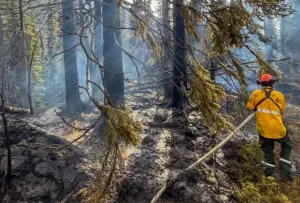
Ont. sees single-day record of 700 new COVID-19 cases
Ontario Premier Doug Ford called the province's record-setting new case count Monday for COVID-19 "deeply concerning" but announced no new public health measures, despite calls by a group of doctors and medical experts calling for a return to Stage 2.
The province reported an additional 700 cases of the infection on Monday, the most on a single day since the outbreak began in late January.
Speaking to reporters, Ford said Ontario is indeed embarking on its second wave, which will be "more complicated, more complex — it'll be worse" than the first.
Still, asked about calls by the Ontario Hospital Association (OHA) to re-implement restrictions to limit the spread of the novel coronavirus, Health Minister Christine Elliott said, "We don't want to turn back a stage unless we absolutely have to."
As for how high the case count needs to climb to get to that point, Chief Medical Officer of Health Dr. David Williams wouldn't say. Williams suggested the province is considering "targeted" measures but didn't specify what measures might be under consideration, where, or at what point they might be implemented.
At a news conference Wednesday afternoon, Williams reiterated the importance of wearing masks and handwashing, urging Ontarians to limit their contact with people and only attend essential gatherings — even though most businesses and establishments in the province are open.
Williams also cautioned against contact with anyone not taking the risk of COVID-19 or the associated public health guidance seriously.
"I would avoid contact with those people," he said. "They may be someone you know."
Also Monday, Williams urged the public against "nice-to-know" testing, saying the province is working to increase testing capacity. Until that happens, he insisted testing should be done on a "need-to-know" basis, meaning anyone seeking a test who does not fall into the current testing criteria should not be tested right now.

Ontario's record-setting new case count Monday for COVID-19 is 'deeply concerning,' says Premier Doug Ford, but the province isn't saying at what point it could reinstate widespread public health restrictions to slow down the spread. (Kate Bueckert/CBC)
The province also announced the recruitment of 3,700 more health-care workers and caregivers, including nurses and personal support workers (PSWs), at a price tag of $52 million.
"Your province needs you right now," Ford said, calling for more Ontarians to consider becoming health-care workers.
Monday's count of new cases surpasses the previous high of 640, which came on April 24, when community transmission of the virus was thought to be at its peak in the province.
A majority of newly confirmed cases are concentrated in four public health units:
Toronto: 344
Peel Region: 104
Ottawa: 89
York Region: 56
Other areas with double-digit increases include:
Niagara Region: 20
Halton Region: 15
Hamilton: 13
Simcoe Muskoka: 12
Elliott said in a series of tweets that about 60 per cent of new cases today were found in people under 40 years old.
Thirty-six are "school-related," according to the ministry, including 27 students, three staff and six people categorized as "individuals not identified." A total of 224 of Ontario's 4,828 publicly funded schools, or about 4.64 per cent, have reported at least one case of the illness.
The news comes as Ontario's labs processed around 41,111 test samples for the illness, with another 49,586 in the queue waiting to be completed. The positivity rate in today's report is 1.7 per cent, markedly higher than on any day since the province ramped up testing significantly in June.
More than 40,000 test samples have been processed on each of the last four days. Elliott has previously said the province hopes to reach capacity for up to 50,000 tests per day in the coming weeks.
The number of people in Ontario hospitals with confirmed cases of COVID-19 continues to steadily rise, and now sits at 128. Twenty-eight of those patients are being treated in intensive care, while 17 are on ventilators.
Further, data from some 40 hospitals around the province was not submitted in time to be included in today's report, the ministry says.
Meanwhile, 44 long-term care facilities throughout the province are reporting outbreaks, a figure that has been slowly increasing in recent weeks. During the peak of COVID-19 cases in Ontario, long-term care residents accounted for about two-thirds of all deaths.
Ontario has now seen a total of 50,531 confirmed cases of COVID-19 over the entirety of the outbreak. Of those, about 85.3 per cent are considered resolved. Another 331 were marked resolved in today's update.
There are currently about 5,571 confirmed, active infections of the novel coronavirus provincewide. The most active cases ever observed were 5,669 on April 23.
WHAT IS COVID AND HOW DID IT GET HERE?
OHA CALLS FOR TIGHTER RESTRICTIONS
Shortly after the Ministry of Health published its daily report, the OHA released a statement calling for stricter public health measures in Toronto, the Greater Toronto Area and Ottawa.
"A return to Stage 2, with restriction on indoor dining and bars, places of worship, weddings, gyms, movie theatres and other non-essential businesses, is needed now to keep schools and prevent a further acceleration of infections," said Anthony Dale, president and CEO of the organization.
The OHA said it has heard from member hospitals that administrators and staff are concerned that a rise in infections will inevitably lead to higher admissions, putting unsustainable strain on resources and care.
"We've seen in jurisdictions around the world how acute care capacity can be easily overwhelmed if the number of positive cases rises too sharply," the statement said.
"While Canada's health-care system has many strengths, our capacity is limited, and we can no longer sustain a false sense of security and belief that this will not happen to us."
Dale said the OHA understands how a return to Stage 2 in these areas could negatively impact businesses but said public health considerations must come first.
This article was written for the CBC.









